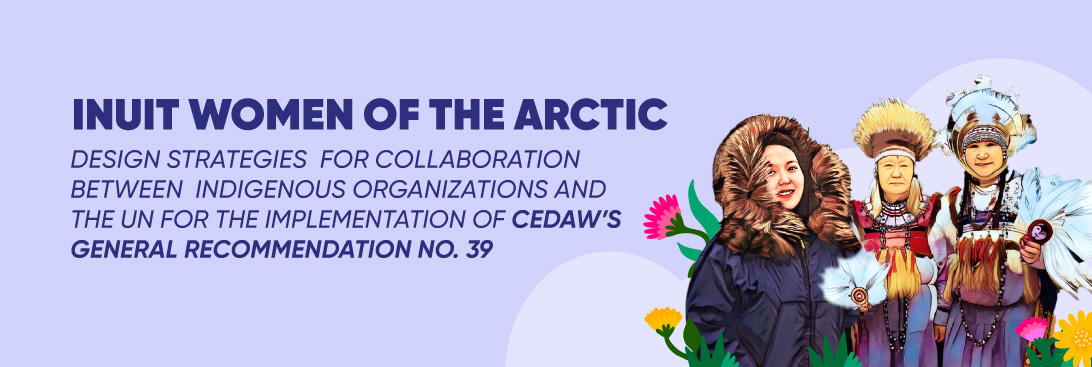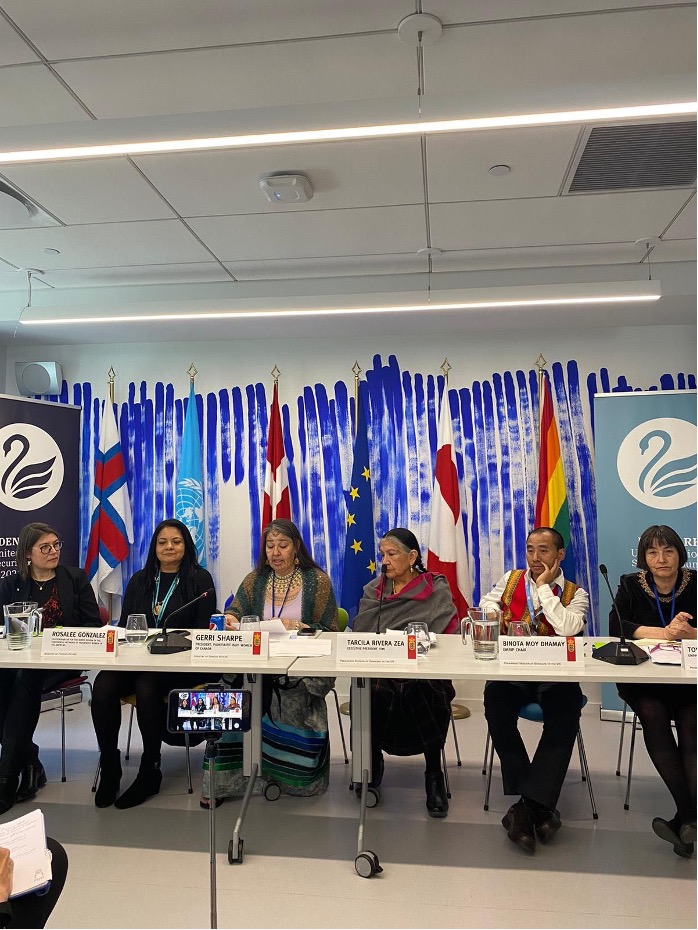
April 20, 2023.- To strengthen the Inuit Women’s movement in the Arctic and keep an open dialogue on the implementation of CEDAW’s General Recommendation Number 39 (GR39), we met in a parallel event to the 22nd session of the United Nations Permanent Forum on Indigenous Issues (UNPFII). The event was organized by the Inuit Circumpolar Council (ICC), the Permanent Mission of Denmark in New York and the International Indigenous Women’s Forum (FIMI), with the aim of promoting the application of this binding international instrument with which States are required to protect the individual and collective rights of Indigenous Girls and Women around the world.
In his opening address, Binota Moy Dhamai, Chair of the Expert Mechanism on the Rights of Indigenous Peoples (2022–2023), a subsidiary body of the United Nations Human Rights Council, explained that GR39, which has been adopted thanks to the hard work of the Indigenous Women’s movements, recognizes the voices of girls, youth and women as agents of change and leaders inside and outside their communities.
“The General Recommendation identifies and addresses the different forms of intersectional discrimination they face, but also mandates access to justice,” Moy Dhamai said. “They have worked hard so that the plan of the Danish government to implant contraceptives to reduce the birth rate in Greenland, carried out in the 1960s and 1970s, never happens again for the Inuit Women and Girls,” she said.
Tarcila Rivera Zea, FIMI’s President, gave a brief overview of the GR39 in her speech. She recalled that different Indigenous Women’s organizations have been articulating themselves in a continental network to protect their rights over the past 30 years. “There were many international instruments that worked to guarantee equality between women and men, but a fundamental piece was still missing: an instrument that specifically addressed the protection of the rights of Indigenous Girls and Women,” she said.
Rivera Zea recognized that the implementation of the GR39 is a challenge. “The objective of the Recommendation is to guide the States to adopt relevant legislative, political and other measures to guarantee compliance with their obligations in relation to the rights of Indigenous Girls and Women. We need to strengthen the negotiation between national governments and international organizations. We need to discuss the actual implementation to see it come down from the global to the local levels, and from there fight corruption to strengthen the protection of rights and access to justice,” she explained.
Gerri Sharpe, President of Pauktuutit Inuit Women of Canada, expressed her gratitude for the dialogue that was launched at this meeting between representatives of international organizations and the Inuit women who live in the different arctic regions of the world.
“We are committed to ensuring that the human rights and priorities of Inuit women are equitably included in the United Nations Declaration on the Rights of Indigenous Peoples Action Plan, which is now being developed by the Canadian federal government in partnership with indigenous organizations,” Sharpe stated. “GR39 will be an excellent tool for collaborative work with the different local authorities,” she added.
Tove Søvndal Gant, member of the UNPFII, recognized that there are still inequalities, structural violence, and alarming corruption rates in some of the countries that have ratified their participation in programs to protect women. “The political will of public officials will be key to adapting the recommendation to local circumstances, and to preventing dishonesty from blocking its full operation,” she said.
She further added that “the governments of Denmark and Greenland should strengthen their political cooperation and ensure that the document is translated into the respective indigenous languages, so that the inhabitants can understand it”.
Finally, talking about how to design collaboration strategies between Indigenous Organizations and the UN, which promote the implementation of GR39, Rosalee Gonzalez, co-coordinator of the northern region of the Enlace Continental de Mujeres Indígenas de las Américas (ECMIA), explained that the most important thing is to continue strengthening the political and citizen participation of Indigenous Women at the General Assembly.
“We need to train the Indigenous Women at the UN so that we may be highly qualified and have experts in the Office of the High Commissioner who know about our needs and issues inside and outside of the indigenous territories,” she said.
The women leaders, she said, play a very important role in monitoring and overseeing the actions implemented by the governments to guarantee effective implementation. Additionally, the women members of civil society organizations can present alternative reports to the committees, showing the gaps and challenges in the application of the recommendation that may not be mentioned in the official reports presented by the States.





